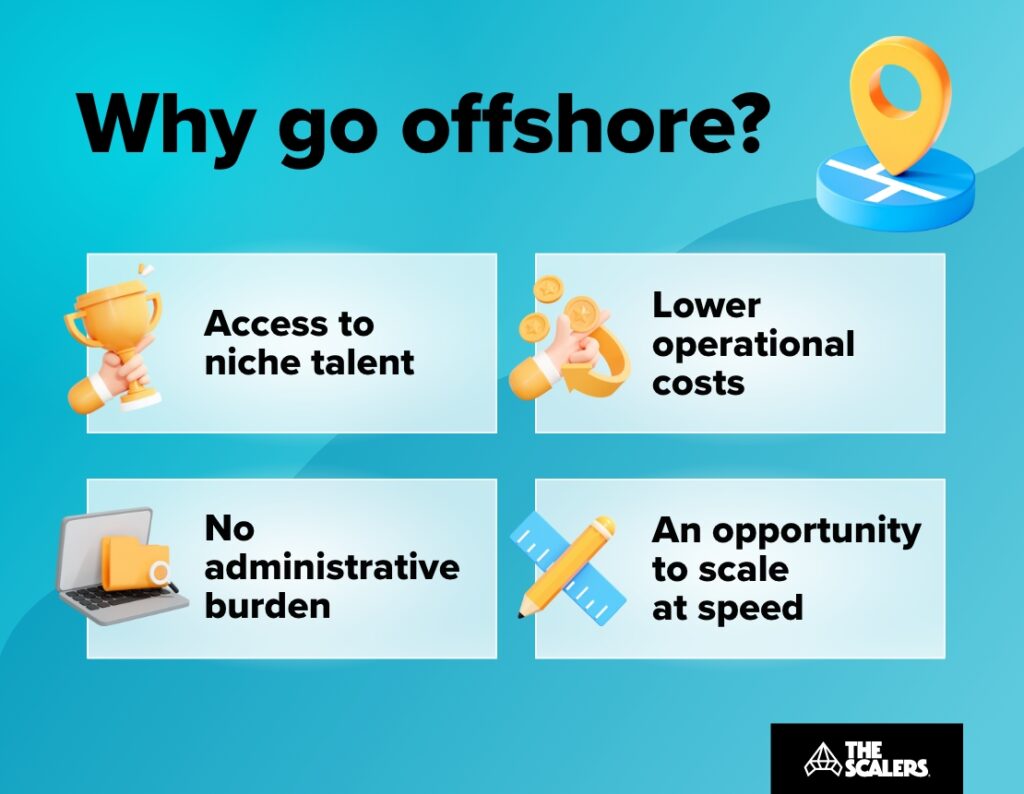Finding tech talent with specialised skills is tough, especially for organisations relying on unreliable or traditional methods to build their teams.
All they get are average developers, mediocre software, lower-quality output, less reliable development, and smaller profit margins.
That’s why today, more and more businesses are trying offshoring, a model that allows them to build and extend development teams with elite engineers in talent-rich countries.
To help you work out if this is the right approach for you and your company, we’ve listed the main benefits of offshore teams and why it’s an excellent option for businesses looking to set up a world-class team that lasts.
We hope you find it helpful!

Saving costs (plus getting great value for money)
In Western countries hiring local talent means significant outlays. You need to pay an absolute premium if you want the best talent.
For instance, the average software engineer’s salary in the US is $178,000.
And salary is only one aspect: there’s the whole recruitment process (and their generous fees), the office space and equipment, plus employee-centric extras like health insurance, flexible working, and plenty of others.
Things are a bit different if you take the offshore route.

Discover how to scale development teams in 2023 and beyond
DOWNLOAD EBOOKFor starters, the cost of living in countries like India is significantly lower than in the West. This correlates with salary, so hiring equivalent labour through offshoring is much more affordable than in your region.
Note: we’re talking about equivalent engineers who happen to live in India, not half-trained programmers with no real experience.
Cities like Bangalore offer thriving and talented IT communities. Software development education is highly desired, comfortably placing software developers in the same bracket as lawyers, doctors, and dentists.
So when you engage with the right offshore partner, you can always find top developers — all at a much lower cost.

Accessing highly specialised talent
We’ve already looked at how expensive salaries can be for Western companies. Unfortunately, that’s not the only cost of building out your team. Recruiter fees average between 15 to 25% of your new employee’s annual salary, if not more!
The real problem (and part of why recruiters charge so much) is tight talent pools.
Even in major cities like London, there is a deficit of quality software engineers available at an affordable cost. Paying full-time employees $60-100 per hour is far above the resources of most companies, but that’s what it’s starting to take.

One sure-shot way to ensure that you escape the scarcity and sky-high pricing is by going offshore.
See India. The country has an astonishingly high number of extremely well-trained developers possessing niche programming skills. Over 1.5 million new engineers are produced yearly, and they flock to tech hubs like Bangalore.
They speak English with total fluency, too. Language barriers with Indian developers inevitably stem from companies who pay freelancers pennies for low-quality work instead of investing in a world-class development centre.

How we helped Preqin establish a 450+ person global R&D centre in India
DOWNLOAD CASE STUDYScaling based on your unique needs
One of the major benefits of offshore teams is that you can (actually) build and scale your tech team on demand.
Especially if you collaborate with a reliable offshore partner.
When done right, offshoring allows you to go from having a few to hundreds of engineers working just for your business. An excellent example is Preqin, a UK FinTech that went from having 4 to over 450 employees in just five years.


Having the flexibility to add more talent to your team whenever needed is a huge plus when managing a fast-growing business.
Let’s say you’re a CTO at a company expanding its services, and you’re asked to find and hire more talent for your tech team. If you opt to offshore software development, you’ll not only be able to onboard elite engineers but extend your team with the skills or technologies you require at any point in time.
Can I outsource instead?
Of course. This is an option that’s good for one-off projects. Outsourced engineers aren’t hired by you but by an external third-party vendor and typically juggle work for many businesses and projects simultaneously.
Because they are external support, the developers don’t have cultural buy-in to your organisation, ethos, or long-term vision.
On the flip side, with an offshore team, the developers are hired by you at the final stage after an offshore partner has implemented a thorough recruitment process combining technical and personality assessments. This ensures the developers hired are a perfect fit for your organisation over the long term.
Outsourcing is often seen as an unsustainable, short-term solution for businesses that prioritise long-term scaling. Many CTOs view it as a quick fix that allows a company to complete small projects, such as building an app, quickly to meet the stipulated deadline.
For enterprises seeking to grow sustainably, a dedicated team that acts as a value-adding extension of their team at home is the preferred route.
Can enterprises grow with an offshore team?
An enterprise can grow with an offshore team, scaling up from startup to small enterprise and upwards without limits.
On a day-to-day basis, as an enterprise, can you actually scale your business and thrive doing it, given that half of your developers work thousands of miles away in a different time zone?
Absolutely.
It’s a valid concern that unsupervised, any group of new employees might not put 100% into the job. But this assumption forgets a crucial tenet of offshoring: they are a fully integrated extension of your local team — including management that reports directly to you.
And with the right offshore partner by your side, there’s no reason to worry. Your offshore partner will handle recruitment, operations, administrative duties, and more while you continue to scale your team and business.

Offshoring isn’t like outsourcing, where you pay freelancers to complete minor tasks. We’re talking about full-time, well-compensated professionals passionate about their work. If it works at home, it will work offshore. And, if it works for smaller businesses, you can grow with an offshore team as an enterprise.

How to make offshore teams function well day-to-day
To ensure offshore teams work well daily, you should consider implementing communication and task-scheduling tools.
If you’re all sharing one office, you can almost get away with ignoring modern work tools like Slack, Asana, or Skype. But when you build your offshore team, there’s no room for that gung-ho attitude. You need structure, and you need it now.
From instant messaging and video calls to task scheduling, there are many simple processes you can implement that massively streamline everything you do.

Can’t find the skills you need at home? Stop searching and start scaling
LEARN MOREShare the right tools and explain how your team uses them, and everything will come together nicely and smoothly. It’s also good to emphasise a culture of ‘if you’re not sure, ask’ — it helps overcome many hurdles early on.
Final thoughts on the benefits of offshore teams
If you plan to grow your tech team with some of the best engineers in the world, offshoring is one of the best models you can use.
While outsourcing can be a valid option for project-based solutions, offshoring is the go-to model for businesses looking to build a fully dedicated team.

Have you tried outsourcing and not got the results you expected? Can’t find the right talent at home?
At The Scalers, we’ve built 80+ offshore teams for tech leaders like you over the past 10 years. If you want to learn more about our unique (and proven) model, fill out this form, and one of our experts will answer all your questions.
Until then, we invite you to read some of our latest blog articles on tech and offshoring. Enjoy!
















